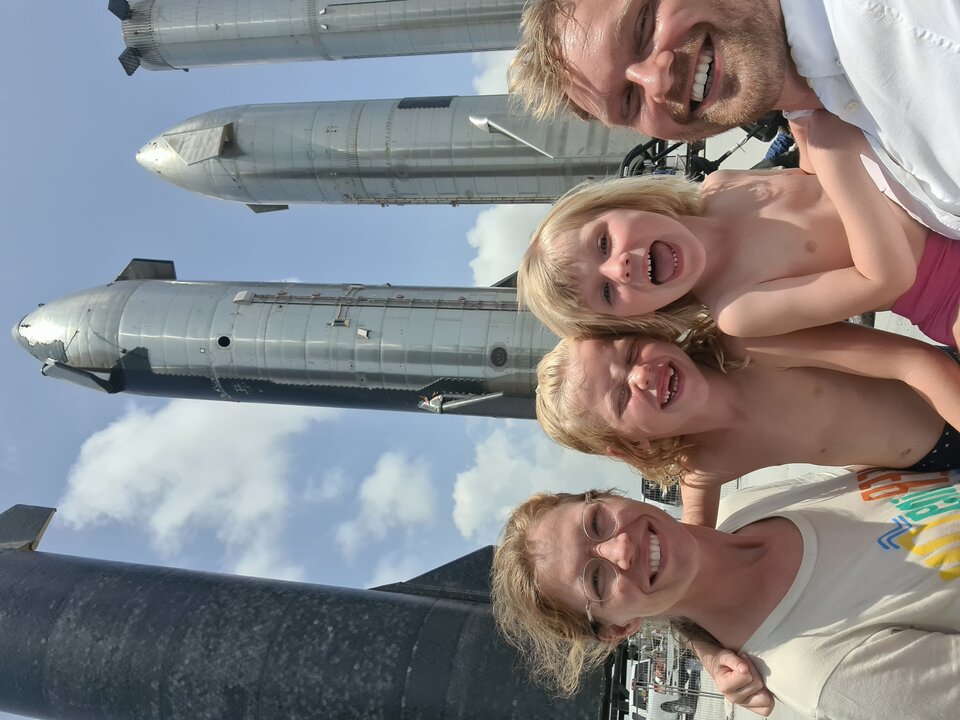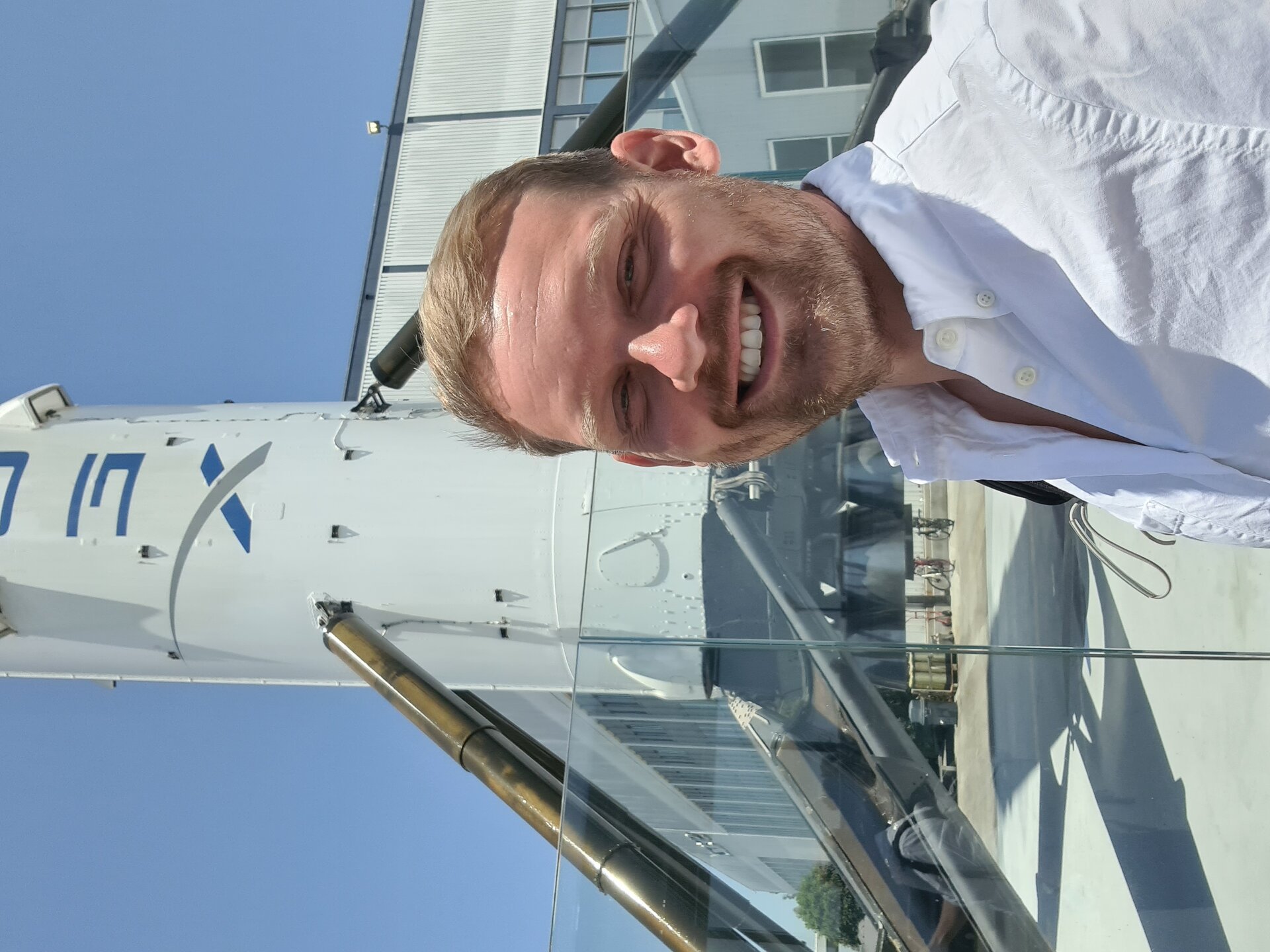"Meet ECSL Members" Series: Hjalte Osborn Frandsen, PhD Research Fellow at the University of Copenhagen and Visiting Scholar at the University of Texas at Austin
Read our "Meet the ECSL Members" latest interview with Hjalte Osborn Frandsen, who is currently a PhD research fellow at the University of Copenhagen and a visiting scholar at the University of Texas at Austin. Learn more about his experience with space governance, delving into the space industry and researching in the American space law realm.

1. Hi Hjalte! How has your day been?
My day has been beyond awesome. As part of my research, I am interviewing satellite operators around the world on how they handle conjunctions and collision avoidance maneuvers. Earlier today it was SpaceX's turn to share their perspectives, which was very informative. After the interview they were kind enough to show me around the factory, as well as their headquarters. To be honest, it kind of blew my mind. All the stuff they are working on, the energy, openness and mind-set is something special.
2. Can you introduce yourself briefly?
I am 36 years old from Copenhagen in Denmark where I live with my two girls Gaia (5), Ragna (3) and my wife Ida. I recently took the slightly radical decision to change the trajectory of my career by leaving management consulting and instead pursue my passion for space governance. Specifically, I decided to work towards a Ph.D. in international space law.
3. How did you decide to specialise in international law after already completing a business degree in economics and management?
I always enjoyed university very much – and so I decided to have another go at it. It was not really a strategic career choice or an “investment into the future”. I did my second masters degree mostly because I could and because I am not in a hurry. In the same vein, the decision 10 years later to go back to academia for a Ph.D. was not motivated by getting the Ph.D. – it is about doing a Ph.D.
I still sometimes get a little giddy when I recall that my job right now is to spend all day reading about, reflecting on and trying to contribute to space governance. A Ph.D. grants you three years to work on the thing you find most interesting in the whole world.
4. Do you think that a business degree is an asset when trying to break into the space sector as a young professional today?
I do not know if the degree in itself is an asset. However, I strongly believe that experience from working with start-ups, business design and strategy is valuable assets. Those kind of experiences can be had with or without a business degree, but the underlying learnings about fermenting and guiding change is something that will be seen as valuable in an increasingly privatised space sector.
5. You are currently based in Texas conducting research on the “Rules of the Road in Orbit” – an exciting PhD project. What can you tell us about conducting research in the US as opposed to your home university in Copenhagen?
My experience of conducting research in the US has been marred a bit by Covid, as most faculties at the university here in Austin have been working from home much of the time. Still, I have met some incredibly smart researchers here and I am very grateful for their support and interest in my project.
One thing I noticed here is that my American colleagues seem less afraid of expressing strong and clear opinions. Back home, our desire to ensure nuance and the fear of overstating results might make us reluctant to communicate conclusions without long lists of reservations.
Also, there seems to be a much greater focus on the research having an impact in society – as opposed to just doing science for the sake of science. At least it is something that has made me think more about the role of my research and what potential roads I have to influencing policy.
6. Do you think that the space law community in the US differs from what you are used to in Europe?
It is my impression that our space law community is in general very globally connected and I am reluctant to generalise based on my personal experiences. I do get the impression that the enthusiasm for treaty based multilateralism is more limited in US space law community compared to Europe.
Lifting the gaze to the space community at large, I feel that the private space industry over here is easier to approach compared to their European counterparts. In general, American satellite operators of all sizes have been exceptionally open and willing to share their perspectives and experiences with conjunction management for my research, with little to no bureaucracy standing in the way. In contrast, getting to talk to the right people at some European operators has been a bit of a herculean task.
7. You are an active ECSL member and join many of its activities. Has this helped your understanding of your PhD topic?
Definitely! I have learned much from presentations and events, but just as importantly, the events have helped me identify relevant academics and people from the industry to talk to. The role that ECSL plays in helping us in the space law community “find” each other is to me fantastically important!
8. Are there any tips you give students who want to pursue a PhD?
Just do it! With the development the industry is undergoing and the many looming and exciting governance issues the time is ripe. Also, do not wait for your local university to realize that they should probably do more space law research. No one at University of Copenhagen was working with or asking for space law projects when I wrote up my arguments and applied for the funding to do my research. I think more universities around Europe need us to help them see that space law is an important discipline.
9. Can you tell us a bit more about returning to academic work after being in the field for many years?
It is definitely like entering another world. In many ways I feel like I have had to re-learn what it means to work, how and what contributions are valued and many other things. I have tried to maintain some of the habits from my earlier career as a management consultant, such as focus on deliveries, timeboxing and project management. However, I have also realised that the substance of research is just different and requires different habits. I have learned that progress is harder to measure and that overzealous attempts at quantifying output can lead to unproductive and unpleasant frustration. It sounds a bit stupid, but I have struggled to understand that spending a whole day just reading a book about something incredibly interesting is not cheating or slacking. It is a legitimate part of the job and not inherently less productive than for example writing.
10. What have your best experiences with the ECSL been?
The practitioners' forums have been great as a nexus with both industry and academic perspectives. However, my favourite type of event is probably still the ECSL Happy Hours – so I hope they return!
11. What is one thing you would like to see the ECSL do in the future?
I would like to see even more room for discussions, conversations and questions in the events. Also, it would be fantastic if the ECSL could somehow facilitate physical events in different member countries. I would definitely be up for contributing to making an event happen in Copenhagen!
12. Is there something that you personally hope to achieve through your ECSL membership?
One of my aspirations is to foster a more active space law community in my country/region and I believe the ECSL could be a resource in that endeavour.
Find out some more of Hjalte's involvement here.


